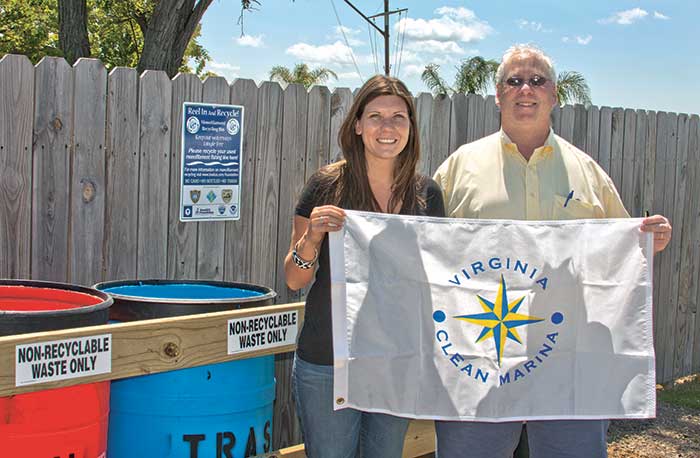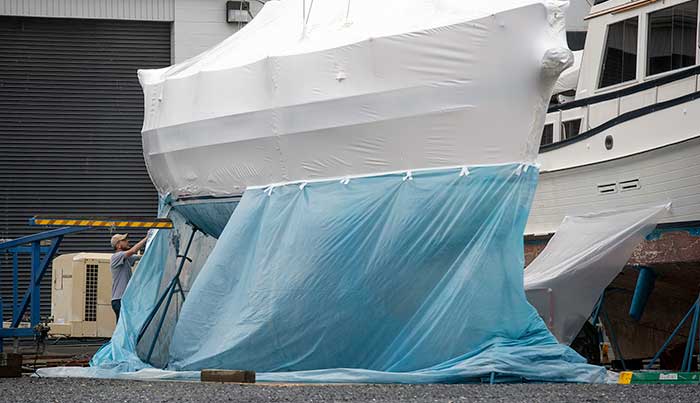Advertisement
More than 30 states have programs to help marinas lessen their environmental impact. Here's what it means to be certified.

Kyle & Robin Schick of Colonial Beach Yacht Center in Colonial Beach, Virginia, hold up their Virginia Clean Marina flag. (Photo: Janet Krenn/Vasg)
Look around your marina sometime and you'll see that the potential for an environmental disaster seems to lurk around every corner. There's antifouling paint, used engine oil and antifreeze, sewage pumpouts, and plenty of user-generated trash, all near the edge of an environmentally fragile waterfront.
While most marinas are pretty good stewards of their own properties, there are programs to help them do all they can to minimize their environmental impact and keep the water around them clean. These are called Clean Marina programs, and 37 states plus the District of Columbia certify marinas that follow recommended best management practices (BMPs).
Tip
Clean Marina programs are voluntary partnerships between the state, private, and public marina owners, boatyards, and yacht clubs that stress environmental protection and meet or exceed all state and federal regulatory requirements — then go beyond. Because each state sets its own requirements, there's no one accepted definition of a clean marina, though they all have important things in common (see "Marina Requirements" below).
One thing the Clean Marina designation is NOT is a marketing ploy. Marinas have to earn the designation by following established BMPs and have to be inspected to verify they do. There's often a substantial cost for the inspection. The list of BMPs is typically in the hundreds and can be daunting, but those that get certified let the boating public know that they take environmental responsibility seriously. Marinas are typically awarded a special Clean Marina flag to fly and plaques or signs to post to let the boaters know about their designation. Most states also have websites that acknowledge those that qualify.
The idea was borne as many state regulatory agencies started looking closely at the environmental impact of marinas. Rather than face more state regulation, a plan to self-regulate was formed. Marina operators understood that a voluntary program was better than more regulation and would likely cost less. They also realized that having environmentally responsible facilities and clean water attracted business, and they benefited from reduced waste disposal and insurance costs.
For boaters, a clean marina means such things as more grassy areas, clean bathrooms that encourage use ashore, convenient and maintained pumpout stations, plenty of trash cans and recycling bins, and used oil and fluid recycling that helps keep the waterways clean, making your time at the marina more pleasant. Also, boatyard work areas are cleaner, with sanders fitted with vacuums to eliminate toxic dust, and tarps under boats to catch spillage. The designation also means marina management realizes that minimizing pollution protects the resources that sustain their livelihood, and that they care about more than just profit.
Tip
While each state sets their own requirements, all of the programs have some things in common: First and foremost, a facility must meet all state and federal regulatory requirements. It also has to meet a specified percentage of voluntary BMPs to become a certified Clean Marina. Typically, marinas renew their status every year, and many states require periodic inspections after three to five years.
Marina Requirements
Each state is different, but there are often hundreds of requirements for marinas to be certified. A typical program will have components that cover marina-design considerations, marina management, emergency planning, petroleum control, sewage and gray water disposal, waste containment and disposal, stormwater management, habitat and species protection, and boater education. Here's a sampling of what it takes to be a Clean Marina.
Waste Disposal
- Provide sufficient waste and recycling receptacles
- Provide for petroleum containment with containers for recycling oil, fluids and filters, and disposing of oily rags and absorbent materials, surrounded by a raised berm
- Maintain a spill-response plan and have cleanup/containment supplies accessible
- Recycle fishing line

Photo: Stacey Nedrow-Wigmore
Boatyard Precautions
- Prevent toxic materials from paint chips and sanding debris, as well as oil and grease from boat maintenance yards and parking lots from washing into water
- Reduce or eliminate landscaping and irrigation runoff
- Locate maintenance areas as far from the water as possible so water runoff can be filtered
- Require maintenance to be performed over filter fabric or over canvas or plastic tarps
- Use a dust-containment bag with sanding equipment
- Inspect and test firefighting equipment regularly
- Use non-water-soluble grease on Travelifts, forklifts, cranes
Marina Management
- Post easy-to-find signs, notices, and marina rules and regulations
- Provide employee training for spills and emergencies
- Develop emergency response plans
- Make restrooms available 24 hours a day
- Require marina contracts to include best management practices for slip-holders and contractors
- Use and sell environmentally responsible products
- Minimize office waste
Clean Waterways
- Locate fuel docks in areas less likely to be subject to wake to avoid fuel spills
- Post signs around pumpouts indicating how to operate and where to call for service
- Keep a supply of easily accessible oil-absorbent pads on fuel dock to mop up spills
- Establish fish-cleaning stations with covered trash receptacles
- Provide pet waste bags and disposal points
- Educate boaters in the use of simple steps to avoid spreading aquatic invaders
